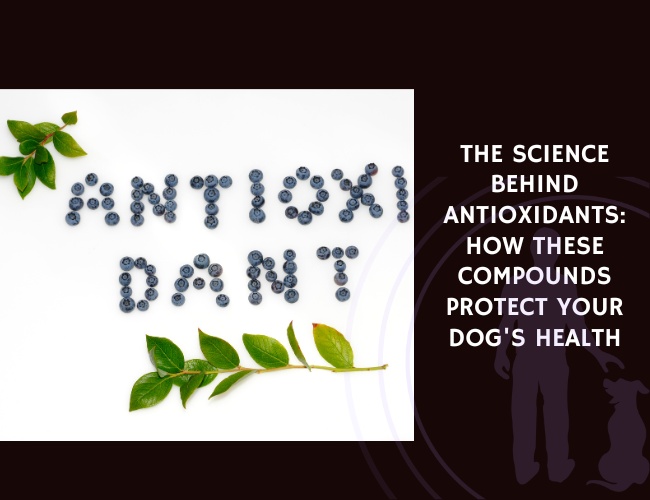Understanding Antioxidants: The Cellular Defenders
Definition of antioxidants and their role in neutralizing free radicals
Antioxidants are compounds that play a crucial role in maintaining the health and vitality of your dog’s cells. They do this by neutralizing free radicals, which are unstable molecules that can cause significant damage to cellular structures. Free radicals are a byproduct of normal metabolic processes, but they can also be introduced through environmental factors such as pollution or a poor diet.
Free radicals are highly reactive due to having unpaired electrons. They seek stability by stealing electrons from other molecules, causing a chain reaction of oxidative damage. Antioxidants donate electrons to these free radicals, effectively neutralizing their harmful effects and preventing this cascade of cellular damage.
Explanation of oxidative stress and its effects on canine cells
When there’s an imbalance between free radicals and antioxidants in a dog’s body, oxidative stress occurs. This condition leads to damage at the cellular level, affecting cell membranes, proteins, and DNA. Over time, oxidative stress can result in chronic inflammation, accelerated aging, and various diseases.
Oxidative stress is particularly damaging because it can compromise the integrity of cell membranes, leading to cell death or malfunction. When proteins are damaged, their functions can be impaired, affecting enzymatic activities and structural roles within the cells. Damage to DNA can result in mutations, which may lead to cancer or other genetic disorders.
How antioxidants prevent cellular damage and support metabolic health
Antioxidants are crucial in preventing the cascade of damage caused by free radicals. By neutralizing these unstable molecules, antioxidants protect the structural integrity of cells and ensure they can function correctly. This protection supports overall metabolic health, enhancing the efficiency of nutrient metabolism and energy production.
Specifically, antioxidants play a role in:
- Reducing chronic inflammation, which is linked to many health issues such as arthritis and cardiovascular disease.
- Protecting brain cells from oxidative damage, thus supporting cognitive function and delaying age-related mental decline.
- Enhancing immune function by maintaining the health of immune cells, thereby enabling them to combat infections and diseases effectively.
By incorporating antioxidant-rich foods and, if necessary, supplements into your dog’s diet, you can help bolster their natural defenses against oxidative stress. This proactive approach supports long-term health and wellness, ensuring your dog can lead a vibrant and active life.
By understanding the fundamental role of antioxidants, you can appreciate the importance of these compounds in your dog’s overall health strategy. Next, we will explore the origins of free radicals and the specific threats they pose to canine well-being.
The Free Radical Threat: Why Dogs Need Protection
Sources of Free Radicals in a Dog’s Environment and Diet
Free radicals are unstable molecules that can come from various sources, posing a threat to your dog’s health. In their environment, dogs are exposed to pollutants such as cigarette smoke, pesticides, and industrial chemicals. Additionally, free radicals can arise from dietary sources, including processed foods high in fats and preservatives.
How Free Radicals Damage Cell Membranes, DNA, and Proteins
Free radicals cause oxidative damage by snatching electrons from other molecules, which can severely impact cell structure. This process damages cell membranes, making them more permeable and disrupting cellular function. Moreover, free radicals can alter DNA, potentially leading to mutations that increase disease risk. Proteins are also not spared; oxidative damage can distort their structure and functionality, impairing metabolic processes.
The Connection Between Oxidative Damage and Inflammation in Dogs
Oxidative damage triggers a cascade of inflammatory responses in dogs. When free radicals attack cells, the body’s immune system reacts, leading to inflammation. Chronic inflammation is a significant concern as it has been linked to various health issues, such as arthritis and heart disease. This ongoing damage and inflammatory response can degrade overall well-being, showing why antioxidant protection is essential.
Caring for your dog’s antioxidant needs involves reducing exposure to free radicals and incorporating antioxidant-rich foods into their diet, which can help counteract the harmful effects of oxidative stress.
Ensure you consult with a veterinarian to tailor a balanced diet and antioxidant plan suited for your dog’s unique needs.
Key Antioxidants for Canine Health
Overview of Essential Antioxidants
Antioxidants play a crucial role in maintaining your dog’s health by combating free radicals, which can cause significant cellular damage. Some key antioxidants essential for canine health include Vitamins E and C, beta-carotene, and Coenzyme Q10 (CoQ10).
- Vitamin E protects cell membranes and bolsters skin and coat health. It’s a fat-soluble vitamin that acts as a powerful antioxidant, helping to neutralize free radicals that harm cells.
- Vitamin C, a well-known immune system booster, also aids in collagen synthesis. This water-soluble vitamin is integral for maintaining healthy skin, joints, and bones.
- Beta-carotene is a precursor to Vitamin A and is vital for vision and immune health. It helps protect cells from oxidative damage while supporting overall eye health.
- Coenzyme Q10 (CoQ10) supports heart and mitochondrial function. It is essential for energy production within cells and helps maintain cardiovascular health.

Specialized Antioxidants
Adding to the essential antioxidants, specialized antioxidants like lutein, zeaxanthin, and glutathione provide targeted benefits to certain systems within the body.
- Lutein and zeaxanthin are carotenoids primarily known for their role in eye health. They help protect eyes from oxidative damage, reducing the risk of conditions like cataracts.
- Glutathione is a tripeptide and a vital antioxidant involved in detoxification processes. It is known as the “master antioxidant” due to its extensive role in cellular protection and repair.
Benefits of Polyphenols and Other Plant Compounds
Polyphenols are a group of naturally occurring compounds found in plants, boasting significant antioxidant properties. These compounds play an essential role in preventing and managing chronic diseases through their anti-inflammatory and immune-supportive actions.
- Polyphenols offer numerous benefits, including reducing inflammation and supporting immune function. Found in colorful fruits and vegetables, they are crucial in fighting oxidative stress and promoting overall health.
- Plant compounds such as flavonoids and tannins found in herbs and green tea further enhance the body’s ability to neutralize harmful free radicals.
As you can see, a variety of antioxidants are necessary for dogs to maintain optimal health. Each type provides unique benefits that collectively strengthen your dog’s cellular defenses.
Transitioning to the next topic, understanding how nature supplies these antioxidants through dietary sources becomes essential to ensure your dog’s diet supports their health effectively.
Nature’s Antioxidant Pharmacy: Dietary Sources
Ensuring that your dog’s diet is rich in antioxidants is a fantastic way to protect their health and enhance their quality of life. Let’s explore some dietary sources of antioxidants that you can comfortably add to your dog’s meals.
Antioxidant-rich fruits and vegetables safe for dogs
Fruits and vegetables are a treasure trobe of natural antioxidants. Blueberries and cranberries are packed with polyphenols which have strong anti-inflammatory properties. Apples, without seeds, are also a good source of Vitamin C, which boosts immune defense and supports overall metabolic health. Spinach and kale are leafy vegetables loaded with vitamins and minerals, including beta-carotene, which is good for vision and immune function. Sweet potatoes and carrots are rich in beta-carotene and other nutrients beneficial for your dog’s health.
Animal-based sources including fish oils with antioxidant properties
Fish oils, especially those derived from salmon and mackerel, are excellent sources of omega-3 fatty acids. These fatty acids not only have antioxidant properties but also support heart health and reduce inflammation in the body. They are especially beneficial for older dogs prone to joint issues. Including fish oils in your dog’s diet can be a simple way to boost their overall antioxidant intake.
Herbs and botanicals that provide antioxidant benefits
Certain herbs and botanicals can offer significant antioxidant benefits as well. Turmeric, widely known for its anti-inflammatory properties, can be a powerful addition to your dog’s diet. Green tea extract contains polyphenols that are beneficial for the immune system. Rosemary is another herb that can provide natural antioxidant effects and is often used as a natural preservative in premium dog foods. Including these herbs in your dog’s meals, in moderation, can significantly enhance their antioxidant intake.
Introducing a variety of antioxidant-rich foods into your dog’s diet can support their health in multiple ways. From enhancing immune function to protecting against chronic diseases, these natural sources are a key part of a balanced and health-promoting diet. As we continue to delve into how antioxidants support your dog’s systems, it becomes clearer why antioxidants are crucial for their overall well-being.
Antioxidants in action: systems they protect
Brain health and cognitive function protection
Antioxidants play a crucial role in safeguarding brain health and cognitive function in dogs. Free radicals, unstable molecules that can cause cellular damage, pose a significant threat to brain cells. This oxidative stress can lead to cognitive decline, particularly in senior dogs. Antioxidants like Vitamin E and C are essential in neutralizing these free radicals, thereby protecting the brain’s cells. Lutein and zeaxanthin are particularly potent in shielding the eyes and brain from oxidative damage, supporting overall cognitive health.
By reducing oxidative stress, antioxidants help to maintain cellular integrity and delay the onset of age-related cognitive disorders. This protective function is vital for preserving your dog’s mental sharpness and overall quality of life as they age.
Cardiovascular system and heart health benefits
The cardiovascular system is another critical area where antioxidants exert their protective influence. Free radicals can wreak havoc on the heart by damaging cell membranes and vital cellular components such as DNA and proteins. This oxidative damage can contribute to the development of heart disease and other cardiovascular issues.
One of the key antioxidants, Coenzyme Q10 (CoQ10), is particularly beneficial for heart health. CoQ10 supports mitochondrial function, which is essential for energy production in heart cells. Other antioxidants like Vitamin E and polyphenols found in certain fruits and vegetables help reduce inflammation and prevent oxidative damage to the heart muscle and blood vessels, thus supporting overall cardiovascular health.

Skin, coat, and joint support through antioxidant action
Antioxidants also provide significant benefits for your dog’s skin, coat, and joints. Skin and coat health are directly influenced by oxidative stress, which can lead to conditions like dermatitis and dull fur. Vitamin E is particularly effective in protecting skin cells and enhancing coat quality, giving your dog a shiny, healthy appearance.
Joint health is another area where antioxidants make a notable difference. Oxidative stress can exacerbate inflammation in the joints, leading to conditions like arthritis. Antioxidants such as glutathione and polyphenols possess anti-inflammatory properties that help reduce joint inflammation and pain. This not only improves joint function but also enhances your dog’s mobility and overall comfort.
By understanding and utilizing the power of antioxidants, you can offer substantial protection to your dog’s brain health, cardiovascular system, and skin, coat, and joints, ensuring they live a longer, healthier, and more vibrant life.
Disease Prevention: The Antioxidant Shield
Antioxidants play a crucial role in promoting your dog’s health by preventing serious diseases. Let’s dive into how these protective compounds work to shield your furry friend from cancer, cardiovascular diseases, kidney diseases, inflammation, and joint health issues.
How antioxidants help prevent cancer and slow tumor growth
Cancer arises due to mutations in DNA, often caused by oxidative damage from free radicals. Antioxidants like Vitamin E, Vitamin C, and beta-carotene work to neutralize free radicals, reducing the risk of DNA mutations. By maintaining cellular integrity, antioxidants lower the chances of malignant transformations. These compounds also slow tumor growth by inhibiting the proliferation of cancer cells and promoting apoptosis (programmed cell death) in abnormal cells.
Keeping a diet rich in antioxidants can help your dog maintain a healthy cellular environment, reducing the risk of cancer and slowing the progression of tumors. Notably, polyphenols, found in many fruits and vegetables, have been shown to have anti-carcinogenic properties, further bolstering the body’s defenses against cancer.
Protection against cardiovascular and kidney diseases
The heart and kidneys are vital organs that are highly vulnerable to oxidative stress. Antioxidants such as Coenzyme Q10 (CoQ10) and Vitamin C support cardiovascular health by improving mitochondrial function and protecting heart cells from oxidative damage. These benefits help maintain healthy blood circulation and reduce the risk of conditions like heart disease and hypertension.
For the kidneys, antioxidants play a significant role in alleviating oxidative stress and preventing chronic kidney disease (CKD). By neutralizing free radicals, antioxidants reduce inflammation and cellular damage in the kidneys, ensuring these essential organs function efficiently. Long-term antioxidant intake supports both heart and kidney health, extending your dog’s overall lifespan and quality of life.
Reducing inflammation and supporting joint health
Inflammation is a natural immune response, but chronic inflammation can lead to degenerative diseases such as arthritis. Antioxidants, especially those with strong anti-inflammatory properties like polyphenols and omega-3 fatty acids from fish oils, help mitigate chronic inflammation. These compounds reduce inflammatory markers and support the repair of damaged tissues, making them crucial for joint health.
By incorporating antioxidants into your dog’s diet, you can help reduce the symptoms of arthritis and improve mobility. This aids in ensuring that your dog remains active and comfortable as they age.
Overall, antioxidants are essential for preventing diseases and maintaining optimal health in dogs. They protect against cancer, support cardiovascular and kidney health, and combat inflammation, thus ensuring your dog leads a healthier and longer life.
As we move forward, let’s explore how you can tailor antioxidant intake to suit different stages of your dog’s life, ensuring they receive the right support from puppyhood to their senior years.
Life Stage Considerations: Tailoring Antioxidant Intake
Understanding how antioxidants play a role in your dog’s health is crucial, but do you know that their needs change as they age? Tailoring antioxidant intake to suit your dog’s life stage ensures they receive the right support when it’s most beneficial.
Puppies: Building Strong Foundations
Puppies are like little sponges, soaking in everything they need to grow up strong and healthy. This is the perfect time to build a solid foundation with appropriate antioxidants. These compounds help develop robust immune defenses essential for fighting off infections and diseases early in life. Key antioxidants for puppies include:
- Vitamin E: Protects developing cell membranes and aids in immune function.
- Vitamin C: Supports the synthesis of collagen critical for growing bones and tissues.
- Beta-carotene: Boosts immune health and supports vision.
Including antioxidant-rich foods like blueberries and sweet potatoes in your puppy’s diet can provide these essential nutrients naturally. Make sure their diet is balanced to encourage proper development and resilience against potential health issues.
Adult Dogs: Maintenance and Recovery
As your dog matures, maintaining their health with a steady supply of antioxidants becomes vital. Adult dogs need antioxidants not only for their daily health but also for recovery support. Whether it’s recovering from a vigorous play session or healing from a minor injury, antioxidants help manage oxidative stress. Essential antioxidants for adult dogs include:
- Coenzyme Q10 (CoQ10): Supports heart and mitochondrial function, which is crucial for energy production.
- Polyphenols: Found in various fruits and vegetables, these plant compounds have anti-inflammatory properties that aid in recovery and day-to-day health.
- Lutein and Zeaxanthin: Protect the eyes from oxidative damage, supporting healthy vision.
Ensuring your adult dog has a diet rich in spinach, kale, and green tea extract helps maintain their health and supports ongoing recovery processes.
Senior Dogs: Combating Age-Related Oxidative Stress
Senior dogs face increased oxidative stress, leading to age-related conditions like cognitive decline and joint issues. Antioxidants play a pivotal role in combating these effects and enhancing quality of life. As dogs age, their bodies produce fewer antioxidants naturally, making dietary intake even more crucial. Key antioxidants for senior dogs include:
- Glutathione: Involved in detoxification and plays a significant role in combating oxidative stress at the cellular level.
- Vitamin E and C: Work synergistically to protect against cell damage and support immune health.
- Polyphenols: Continue to offer anti-inflammatory benefits, crucial for managing joint health and reducing pain associated with arthritis.
Adding antioxidant-rich foods like blueberries, cranberries, and fish oils to your senior dog’s diet can help reduce inflammation and support longevity.
By tailoring antioxidant intake according to your dog’s life stage, you can provide optimal support for their health and wellness. Through every stage of life, appropriate antioxidants can help ensure your dog’s diet is as beneficial as possible. And remember, consult with your veterinarian to design the perfect plan for your furry friend.
Supplementation Strategies: When and How
Antioxidants play a crucial role in maintaining your dog’s health, but sometimes, dietary sources might not be enough. Understanding when and how to supplement your dog’s intake effectively is essential. Let’s dive into identifying which dogs might benefit from antioxidant supplementation, the potential risks involved, and the guidelines for choosing the best supplements.
Identifying dogs that may benefit from antioxidant supplementation
Certain dogs are more likely to benefit from antioxidant supplements. These include:
- Senior dogs: As dogs age, their bodies are less efficient at producing and utilizing antioxidants, leading to increased oxidative stress and the risk of diseases like arthritis and cognitive decline.
- Working dogs: Dogs that perform high-intensity tasks (e.g., service dogs, herding dogs) expend more energy, resulting in a higher production of free radicals.
- Dogs under stress: This includes dogs experiencing environmental stressors, undergoing medical treatments, or facing significant lifestyle changes.
For these dogs, antioxidants can offer additional support and enhance their overall well-being.

Potential risks of over-supplementation and toxicity concerns
While antioxidants are beneficial, over-supplementation can be harmful. Excessive intake can lead to toxicity and nutrient imbalances. For example:
- Vitamin E: Too much Vitamin E can interfere with blood clotting and cause issues like excessive bleeding in dogs.
- Vitamin C: Although relatively safe, high doses can lead to gastrointestinal upset and kidney stones.
- Beta-carotene: Over-supplementing can cause harmless, yet unusual, color changes in the skin and coat.
These issues highlight the importance of providing the correct dosage and types of antioxidants.
Guidelines for choosing quality supplements and proper dosing
Selecting the right supplement and dosing properly is key to safe and effective antioxidant use. Here are some guidelines:
- Consult your veterinarian: Before starting any supplementation, it’s essential to get professional advice. Your vet can help determine the right type and dose based on your dog’s specific needs.
- Choose natural over synthetic: Natural antioxidants from whole food sources are often more beneficial and safer. Look for supplements that list natural sources such as mixed tocopherols (Vitamin E) and ascorbic acid (Vitamin C).
- Read the label carefully: Check for clear dosing instructions and be cautious of products with long ingredient lists and unfamiliar additives.
- Monitor your dog’s response: Regularly check for any changes in behavior, coat condition, and overall health. If you notice any adverse reactions, consult your vet immediately.
By following these guidelines, you can ensure your dog receives the appropriate antioxidant support without the risk of over-supplementation. This balanced approach helps to promote your dog’s long-term health and vitality.
Commercial Dog Food: Evaluating Antioxidant Content
Natural vs. Synthetic Antioxidants as Preservatives
When it comes to your dog’s food, the source of antioxidants matters. Dog foods often contain preservatives to maintain freshness, and these preservatives can be either synthetic or natural. Synthetic antioxidants, including Butylated Hydroxyanisole (BHA), Butylated Hydroxytoluene (BHT), and ethoxyquin, are commonly used. While effective, these chemicals have sparked concerns regarding their long-term safety. For example, some studies suggest that high doses might be linked to health issues.
Natural preservatives, on the other hand, are gaining popularity. Ingredients such as Vitamin E (often listed as mixed tocopherols) and rosemary extract not only extend the shelf-life of dog food without harmful side effects, but they also offer additional health benefits. Vitamin E is an essential nutrient for dogs, supporting cell function and skin health.
Therefore, when choosing dog food, consider those with natural antioxidants. These options not only help keep the food fresh but also contribute to your dog’s overall health.
How to Read Labels to Identify Antioxidant Sources
Reading dog food labels can be complex, but it’s crucial for selecting the right product. Here’s what to look for to ensure your dog’s diet is rich in antioxidants:
- Ingredient List: Natural antioxidants such as Vitamin E, Vitamin C, and herbs like rosemary or turmeric should be mentioned explicitly.
- Guaranteed Analysis: This section can provide insights into the levels of different vitamins, including antioxidants.
- Claims on Packaging: Look for phrases like “natural preservatives,” “rich in antioxidants,” or “no synthetic preservatives.”
By carefully examining these components on the label, you can make informed decisions to enhance your dog’s diet.
The Growing Trend Toward Antioxidant-Enriched Premium Dog Foods
There is an increasing trend for dog foods that are specifically marketed as antioxidant-enriched. These premium foods often highlight their use of high-quality, natural ingredients and specify the antioxidants included. This trend reflects the growing awareness of the benefits of antioxidants for canine health, such as boosting the immune system and reducing inflammation.
Premium dog foods are designed to offer complete nutrition and often exceed standard requirements. They frequently include a mix of essential vitamins, minerals, and specialized ingredients like CoQ10, which supports heart health, and polyphenols from fruits and vegetables, known for their anti-inflammatory properties.
Opting for these premium options can be beneficial, especially if you’re looking to provide your dog with a diet that supports longevity and overall well-being.
To continue on your journey of understanding how to naturally enhance your dog’s health through diet, let’s take a closer look at strategies for working with your veterinarian to create an antioxidant plan tailored to your dog’s specific needs.
Working with Your Veterinarian: Creating an Antioxidant Plan
The importance of professional guidance before making dietary changes
When it comes to enhancing your dog’s health with antioxidants, consulting your veterinarian is crucial. Just as you wouldn’t start a new diet or medication without professional advice, the same applies to your dog. Veterinarians can assess your dog’s specific needs, taking into account their breed, age, health status, and lifestyle. They can help identify the right balance of natural antioxidants and recommend the best dietary sources or supplements tailored to your dog’s unique requirements.
How to monitor the effects of antioxidant supplementation
After incorporating antioxidant-rich foods or supplements into your dog’s diet, it’s important to monitor their effects. Regular check-ups with your veterinarian are key to ensuring the chosen antioxidants are having the desired impact. Look out for signs of improved health, such as:
- Enhanced energy levels: Your dog might seem more playful and active.
- Improved coat condition: A shinier, healthier coat is a good indicator of antioxidant benefits.
- Better digestion: Less stomach upset and more regular bowel movements are positive signs.
- Reduced inflammation: Notice if joint pain or stiffness decreases, making mobility easier.
If any adverse effects occur, such as digestive issues or unusual lethargy, consult your vet immediately. Adjustments to dosage or switching to different sources might be necessary.
Creating a balanced approach to antioxidant nutrition for your dog’s specific needs
Every dog has unique nutritional needs, and a balanced approach is vital to avoid any potential issues from over-supplementation. Here’s how you can achieve that:
- Natural dietary sources: Focus on including antioxidant-rich fruits, vegetables, and herbs in your dog’s diet. Consider options like blueberries, spinach, and turmeric, which are safe and healthy.
- Controlled supplementation: If your dog has increased needs, such as seniors or working dogs, controlled supplementation might be necessary. Ensure these supplements are derived from natural sources and follow veterinary guidelines for proper dosing.
- Ongoing assessment: Keep an eye on your dog’s overall health and well-being. Regular vet visits are essential to reassess and tweak the antioxidant plan as necessary.
By collaborating with your veterinarian, you can develop a tailored antioxidant strategy that promotes your dog’s health. Remember, veterinarians have the expertise to guide you in making the best choices for your furry friend’s longevity and quality of life.










